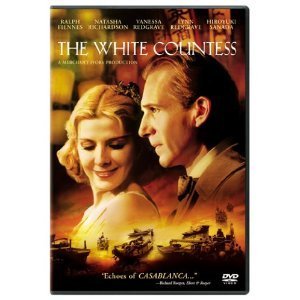The White Countess, my favorite Shanghai movie
Thousands of white Russian refugees flooded Shanghai after the communists won the Russian civil war. Shorn from the cream of the Russian aristocracy, most arrived in Shanghai destitute, many having never done a day's work in their lives. The able bodied men were forced into menial service jobs in restaurants or construction. Former Russian Army officers found work as bodyguards, often for rich Chinese businessmen "making face" employing Caucasians as servants. Elderly women learned to sew and cook. Young White Russian women found work as dance hostesses, became mistresses to expatriate Western businessmen, or else dealt outright in the sale of intimate favors.
 The White Countess, a movie directed by James Ivory and starring Ralph Fiennes, Natasha Richardson, and Vanessa Redgrave, evokes the glitter and grime of 1930s Shanghai. It's a slowly developing, character-driven film, but what characters! Ralph Fiennes plays Todd Jackson, a blind American diplomat who dreams of creating a perfect bar to help him escape the realities of a world careening toward war. (He apparently lost his eyesight and his family in one of the violent "incidents" that plagued China at the time.) Natasha Richardson plays the Countess Sofia Belinskya, a White Russian exile supporting her daughter, Katya, and her deceased husband's aristocratic family by working as a dance hostess in a Shanghai nightclub. Vanessa Redgrave is the Princess Vera Belinskya, Sofia's mother-in-law.
The White Countess, a movie directed by James Ivory and starring Ralph Fiennes, Natasha Richardson, and Vanessa Redgrave, evokes the glitter and grime of 1930s Shanghai. It's a slowly developing, character-driven film, but what characters! Ralph Fiennes plays Todd Jackson, a blind American diplomat who dreams of creating a perfect bar to help him escape the realities of a world careening toward war. (He apparently lost his eyesight and his family in one of the violent "incidents" that plagued China at the time.) Natasha Richardson plays the Countess Sofia Belinskya, a White Russian exile supporting her daughter, Katya, and her deceased husband's aristocratic family by working as a dance hostess in a Shanghai nightclub. Vanessa Redgrave is the Princess Vera Belinskya, Sofia's mother-in-law.
When the self-destructive Jackson wagers his life savings on a horse at the Shanghai Racecourse and wins, he decides to use his gains to open the establishment of his dreams, often advised by his Japanese friend and confidant, Mr. Matsuda (ably portrayed by Hiroyki Sanada). Jackson decides that he needs a hostess to inject his nightclub with a necessary air of opulent tragedy, and through a series of encounters, determines that the Countess Sofia is the uniquely perfect woman for the needs of his bar. On Sofia's side of the coin, while she supports her in-laws and daughter with her nightclub work, they scorn her for working a job that edges so close to prostitution and lament the "disgrace" Sofia's job heaps upon her daughter, who is their blood. The in-laws bid to escape Shanghai with Sofia's daughter Katya, but conspire to leave Sofia and her disgrace behind. As their lives intersect and entwine, Mr. Jackson and the Countess Sofia take a long time to realize that they've fallen in love, and Mr. Jackson is forced to confront the reality that he cannot escape the world deteriorating around them. The movie climaxes amid events loosely modeled on the "Bloody Saturday" bombings that shook Shanghai on August 14, 1937.
The White Countess wasn't universally well-reviewed, but I confess to loving this film. I've watched it half a dozen times.
"Bloody Saturday" is a significant incident in China's Wings. On that day, Shanghai's International Settlement was struck by poorly aimed bombs dropped from Chinese bombers ostensibly trying to hit the Japanese battleship Idzumo, flagship of the Imperial Japanese Navy in Shanghai, symbol of Japan's presence in China, and, at the time, without question the world's most despised warship. Tragically, in two separate incidents, the errant bombs struck knots of refugees — the first hit the intersection of Nanking Road and the Bund, the second exploded on the Great World Amusement Hall, which had been converted into a refugee shelter. The carnage was incredible — 1,740 civilians died in the two bombings.
There are several other – and not nearly so appalling – convergences between China's Wings and The White Countess. My favorite occurs early in the film when Mr. Jackson mentions "The Little Club." I first saw the film in an art house with friends in San Franciso's Richmond district, and I nearly jumped out of my seat at that line, because The Little Club is the nightclub where William Langhorne Bond, China's Wings main character, took his future wife, Katharine "Kitsi" Dunlop, on their first dry land date. They'd met crossing the Pacific on the SS Empress of Japan. Months later, I was interviewing Elizabeth "Bo" Bixby, one of Harold M. Bixby's four daughters, and I asked her, tentatively, not expecting an answer, if she remembered a nightclub called The Little Club. "Oh!!!" she squealed, "The Little Club was the best nightclub in Shanghai!" Bo then proceeded to describe the club in exquisite detail. For me, that was one of the most charming moments in all of my interviewing for China's Wings. Bo must have been in her 80s when we spoke, and it was wonderful to listen to her reminisce with such audible delight.
Several CNAC pilots kept White Russian mistresses during the 1930s. Indeed, William Bond's girlfriend before he met Kitsi was named 'Stasia, clearly short for Anastasia, and in our interview, Bo Bixby described her as "amazingly beautiful."
But that's another story.




